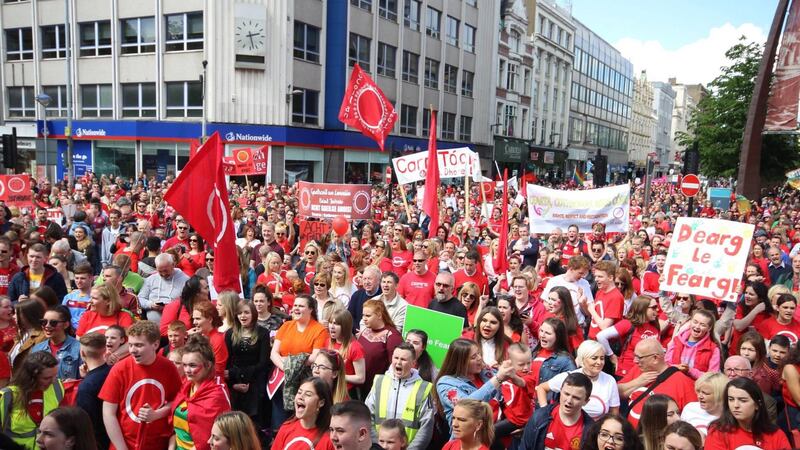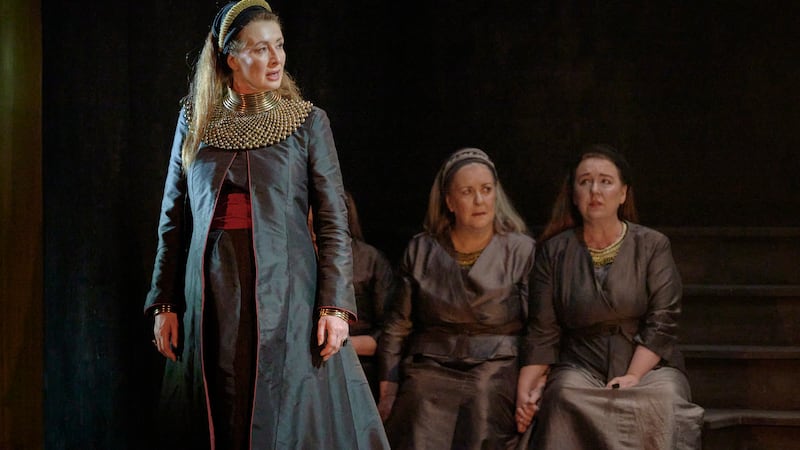Go mbeannaí Dia daoibh agus bhur gcéad míle fáilte isteach chuig the Bluffer’s Guide to Irish.
Well, what a day Saturday was for the Irish language!
The fourth mórshiúl - march for proper recognition for the Irish language was undoubtedly the most important yet coming at a time when the language is at the heart of political debate here.
If you want to talk about a group of people you normally use scaifte whatever the size.
Bhí scaifte beag ann - there was a small crowd there you could say about a minor football match for example.
If it is a large crows you would say slua and if is a huge crowd, you would say bhí slua ollmhór ann - there was a huge crowd there.
And although the numbers might vary, all the photographs show that there was a ginormous crowd at the Lá Dearg march from Cultúrlann McAdam Ó Fiaich to Halla na Cathrach - the City Hall in Belfast.
It was a sight to behold, balm for the soul, a tonic for the heart.
If it’s adjectives you’re after, you could call it spraíúil - fun, dearfach - positive, fuinniúil - energetic and it was all those.
It was a strong retort to those who see Irish as something akin to tiddlywinks or trainspotting or even the never-ending demands of large aquatic reptiles. An Lá Dearg - the Red Day names because the Irish-speaking community is Dearg le Fearg - Red with Anger at the continuing delays in bringing in Acht na Gaeilge - an Irish language Act as promised in the St Andrew’s Agreement.
Yesterday’s thousands were made up of an meanaicme agus an aicme oibre - the middle class and the working class, óg agus aosta - young and old, fir, mná agus páistí - men, women and children.
There were nationalists and unionists there in a crowd that stretched from the City Hall back to Castle Street.
At the Dome of Delight they heard stirring speeches, great Irish music, a bit of dancing in what was as much a celebration as a protest march.
It was the celebration of the future that those who choose to speak Irish see for themselves and for anyone who wants to join them.
It is a future that is based on respect for others so one piece of jargon that you’ll hear a lot is pobal-lárnaithe - centred on the community so Irish groups all over the north see the language as one ingredient of improving the lives of everyone, through sláinte - health, eiceolaíocht - ecology, cultúr - culture, oideachas - education and every other aspect of life that has an impact on how ordinary people can get as much out of life as is possible.
People might look at Irish as a hobby like playing golf or watching Eastenders but it’s much more than that.
As for the politicisation of the language,things that need change or regulation or promotion need legislation therefore they all have a political dimension. Irish is no different. It has been politicised continuously since 1366 – but that’s a story for another day.
Saturday’s Dream Dearg march will hopefully make people see that everyone will win if we get an Irish language Act.
CÚPLA FOCAL
mórshiúl(more-hyooil) - march
scaifte(scaftcha) - crowd
Bhí scaifte beag ann (vee scaftcha big un) - there was a small crowd there
bhí slua ollmhór ann(vee slooa ulwore un) - there was a huge crowd there
Halla na Cathrach(hala na cahrakh) - the City Hall
spraíúil(spreeeooil) - fun
dearfach(jarafakh) - postitive
fuinniúil(fwinyooil) - energetic
An Lá Dearg(un laa jarag) - the Red Day
Dearg le Fearg(jarag le farag) - Red with Anger
Acht na Gaeilge(akht ne gaylicka) - an Irish language Act
an meanaicme agus an aicme oibre(un maaneeckma agis un ackma ibra) - the middle class and the working class
óg agus aosta(awg agis eesta) - young and old
fir, mná agus páistí(fir, mraa aguis paashtee) - men, women and children
pobal-lárnaithe(pubble laarneeha) - centred on the community
sláinte(slaantcha) - health
eiceolaíocht(eck-oleeakht) - ecology,
cultúr(cultoor) - culture
oideachas (ijahiss) - education


